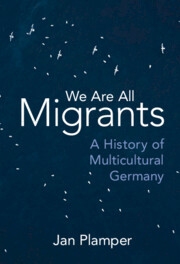Book contents
- We Are All Migrants
- We Are All Migrants
- Copyright page
- Dedication
- Contents
- Figures
- Acknowledgments
- Introduction
- 1 We Are All Migrants, Almost Everywhere, Almost Always – Especially the Germans
- 1945
- 2 Twelve-and-a-Half Million in Six Years
- 3 Labor Migration to West Germany
- 4 Labor Migration to East Germany
- 5 Asylum
- 1989
- Conclusion
- Appendix: Dates and Facts
- Notes
- Index
4 - Labor Migration to East Germany
from 1945
Published online by Cambridge University Press: 16 March 2023
- We Are All Migrants
- We Are All Migrants
- Copyright page
- Dedication
- Contents
- Figures
- Acknowledgments
- Introduction
- 1 We Are All Migrants, Almost Everywhere, Almost Always – Especially the Germans
- 1945
- 2 Twelve-and-a-Half Million in Six Years
- 3 Labor Migration to West Germany
- 4 Labor Migration to East Germany
- 5 Asylum
- 1989
- Conclusion
- Appendix: Dates and Facts
- Notes
- Index
Summary
Unlike the Western Gastarbeiter, the GDR labor migrants were recruited later (the 1980s), fewer (no more than 200,000), from other countries (Vietnam, Mozambique, Poland), objects of secret service surveillance (by the Stasi), and portrayed not as labor migrants, but recipients of “brotherly” socialist solidarity. Yet the motivation for recruiting them (labor shortages) and their experience of living among Germans were similar: segregated from the general population; objects of paternalism, exoticization, hypersexualization, dehumanization, racist violence; and enticed to leave with – modest – financial bonuses when no longer needed (1983 in Western, 1990 in Eastern Germany). What was fundamentally different was that the GDR portrayed itself as an anti-racist internationalist society; that the countries of origin of the labor migrants deducted a large portion of their earnings and never returned it when the “contract workers” (Vertragsarbeiter) were forced out after the 1989 fall of the Berlin Wall; and that, consequently, the deported labor migrants often ended up living in poverty at the margins of their societies rather than reaping the benefits of their hard work in the GDR.
Keywords
- Type
- Chapter
- Information
- We Are All MigrantsA History of Multicultural Germany, pp. 83 - 105Publisher: Cambridge University PressPrint publication year: 2023

